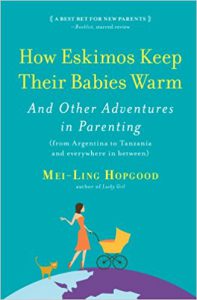How Eskimos Keep Their Babies Warm: Child-Raising Discoveries from Around the World (from Argentina to Tanzania and Everywhere in Between), by Mei-Ling Hopgood
How Eskimos Keep Their Babies Warm: Child-Raising Discoveries from Around the World (from Argentina to Tanzania and Everywhere in Between)
By Mei-Ling Hopgood
Algonquin Books
Four Stars
Reviewed by Jessica Gribble
As a parent, I’m always wondering if there’s a better way to raise a kid, so when I heard about a book called How Eskimos Keep Their Babies Warm: Child-Raising Discoveries from Around the World (from Argentina to Tanzania and Everywhere in Between), I bought it immediately. The table of contents promises a tour of parenting, with chapters discussing child-rearing practices in Argentina, France, Kenya, China, the border areas of the Congo and the Central African Republic, the United States, Tibet, Japan, Polynesia, and Mexico.
The author, Mei-Ling Hopgood, is a Taiwanese-American whose daughter Sophia was born while she and her husband lived in Buenos Aires. Her Taiwanese siblings had lots of helpful suggestions, including folding a thousand cranes for good luck and drinking only hot beverages after the birth. Her Korean sisters-in-law slept with their kids into toddlerhood and made steamed rice wrapped in seaweed nori for snacks. And the Argentines nearby let their kids stay awake late into the night. It occurred to Hopgood that if she “asked the right questions, [she] could learn a ton about parenthood from people in different cultures.”
In the earnest introduction, Hopgood relies on anthropology texts to offer the carefully non-judgmental explanation that “the parental practices we follow in the West are merely cultural constructions that have little to do with what is ‘natural’ for babies. Our cultural rules are, in fact, designed to mold a certain kind of citizen (Small, Our Babies, Ourselves: How Biology and Culture Shape the Way We Parent).” Readers are meant to remember this throughout, and Hopgood is careful to show some good and bad points about each parenting decision.
The book begins in Buenos Aires. We learn that Argentine children go to bed late because adults think that spending time together as a family is more important than maintaining a strict schedule. In France, kids eat everything, even smelly cheese, because it’s offered to them as something delicious, and families take time to eat and even grow food together. In Kenya—and lots of other places—people don’t use strollers, carrying their babies on their backs or in their arms. The Chinese have traditionally potty-trained their children between the ages of one year and eighteen months, partly by using split-bottom pants. Aka Pygmy fathers care for their babies almost half the time. Lebanese Americans maintain their kinship ties in the United States, where families live nearby and participate in everything from running businesses to buying cars and going out to dinner together. Tibetan Buddhists believe in a link between the mental and spiritual state of a mother and her child’s health and personality, so pregnant women are provided with a joyous and stress-free atmosphere. The Japanese let children handle their own problems, even when they fight, because they’re being socialized to live in a harmonious society. Polynesian children play on their own without parents hovering nearby or playing with them. Mayan villagers give their children age-appropriate work to do because they need the extra help and children thrive when they’re a useful part of society. And Asian children do well in school because their parents and other relatives consistently insist that they must try hard.
In the end, the book offered some interesting ways to think about childrearing. Like many current nonfiction books, it’s written with plenty of research, distilled into crowd-friendly terminology, and broken up with charming anecdotes that reflect the author’s mistakes and triumphs. I find that tone infantilizing after a few chapters, and Hopgood’s determined relativism gets annoying. Nevertheless, it was fun to learn about children and parents in other cultures, and there are some parenting strategies readers will want to try.
